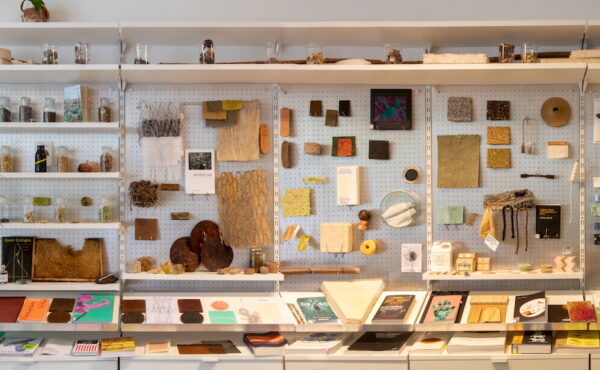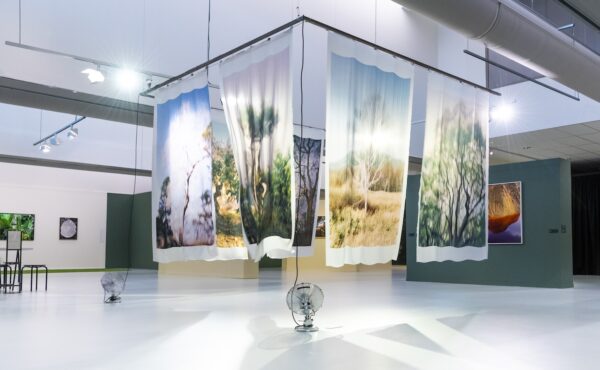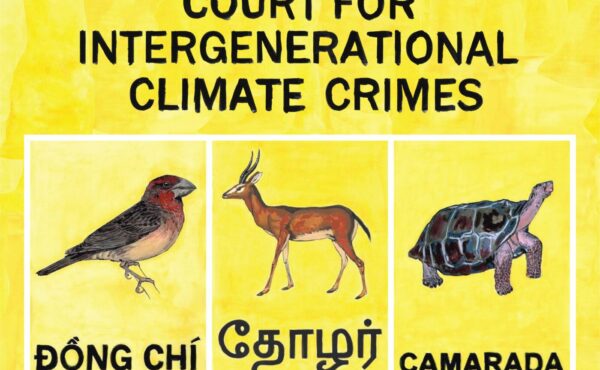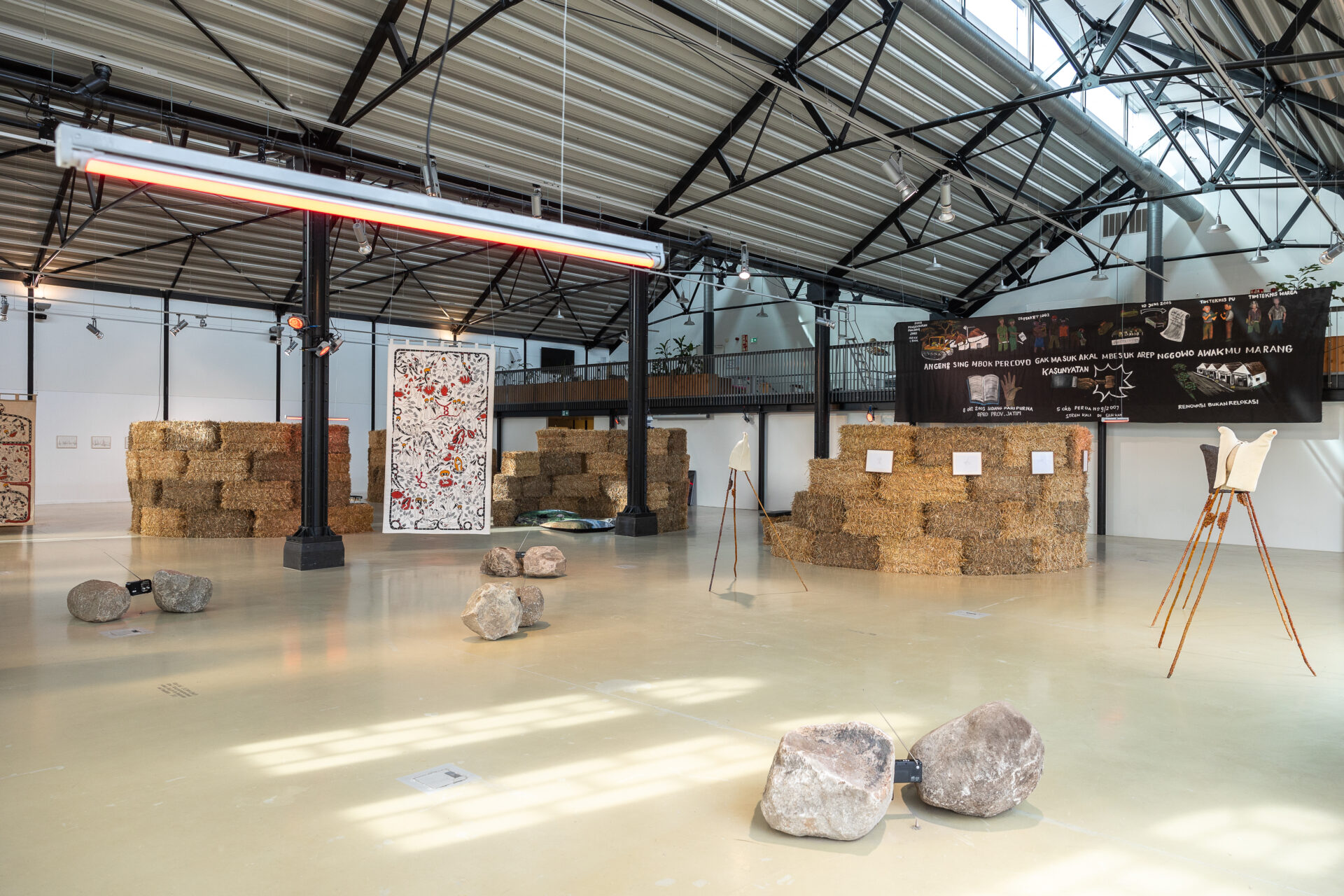
Rain crackles like fire in ‘The One-Straw Revolution’ at Framer Framed
‘The One-Straw Revolution’ at Framer Framed envisions an intersectional reformulation of the way humans interact with the world and its creatures. In the exhibition, themes of colonial violence, coexistence, ancestral knowledge, resilience, and fragility intertwine and flow from one work to the other – as to declare: all these struggles, all these joys are very much interconnected with each other.
Unexpectedly enough, yet utterly coherently, the first sensory experience of the exhibition is a humid, tepid, sweetish smell of straw that pervades the space and fills in my nostrils when I open the door. If I closed my eyes, and took a deliberate breath in, I could have imagined to be entering a pasture. Straw bales stacked upon each other delineate some sort of little islands in an otherwise clean space. They help me to move through the exhibition, and their chest-level height suggests an horizontal approach to the viewing. I have to walk around each island to see the work circumscribed in its embrace, as if they were all different crops part of a permaculture, sharing the same space but each needing specific attentions.
Permaculture is indeed a pertinent term in this context. Moving within an expanding cultural discourse around ecology, curator iLiana Fokianaki drew inspiration exactly from this agricultural practice to mould the exhibition The One-Straw Revolution into the space of Framer Framed. Remarkably enhanced by Katharina Sook Wilting & Tal’s design, the one room in which the exhibition unfolds accommodates a group of international artists showcasing works of different nature, from video to sculpture, drawing, and textile. For whom is not familiar with the practice of permaculture, it entails the creation of different zones in a cultivated field that help human and more-than-human elements to work with rather than against each other. In Fokianaki’s broader research, permaculture is both a metaphor and methodology through which she approaches the delicate limbo between the work of artists and the society in which these works circulate. In the specific case of The One-Straw Revolution, this limbo is an invitation to slow our pace and reflect on the consequences – both harmful and beneficial – human actions have on the earth and her beings.
Imagine: what would an (art) institution look like if – instead of let’s say a pyramid – it was organised like a field where different zones are dedicated to different scopes, and all these zones worked in symbiosis with each other?
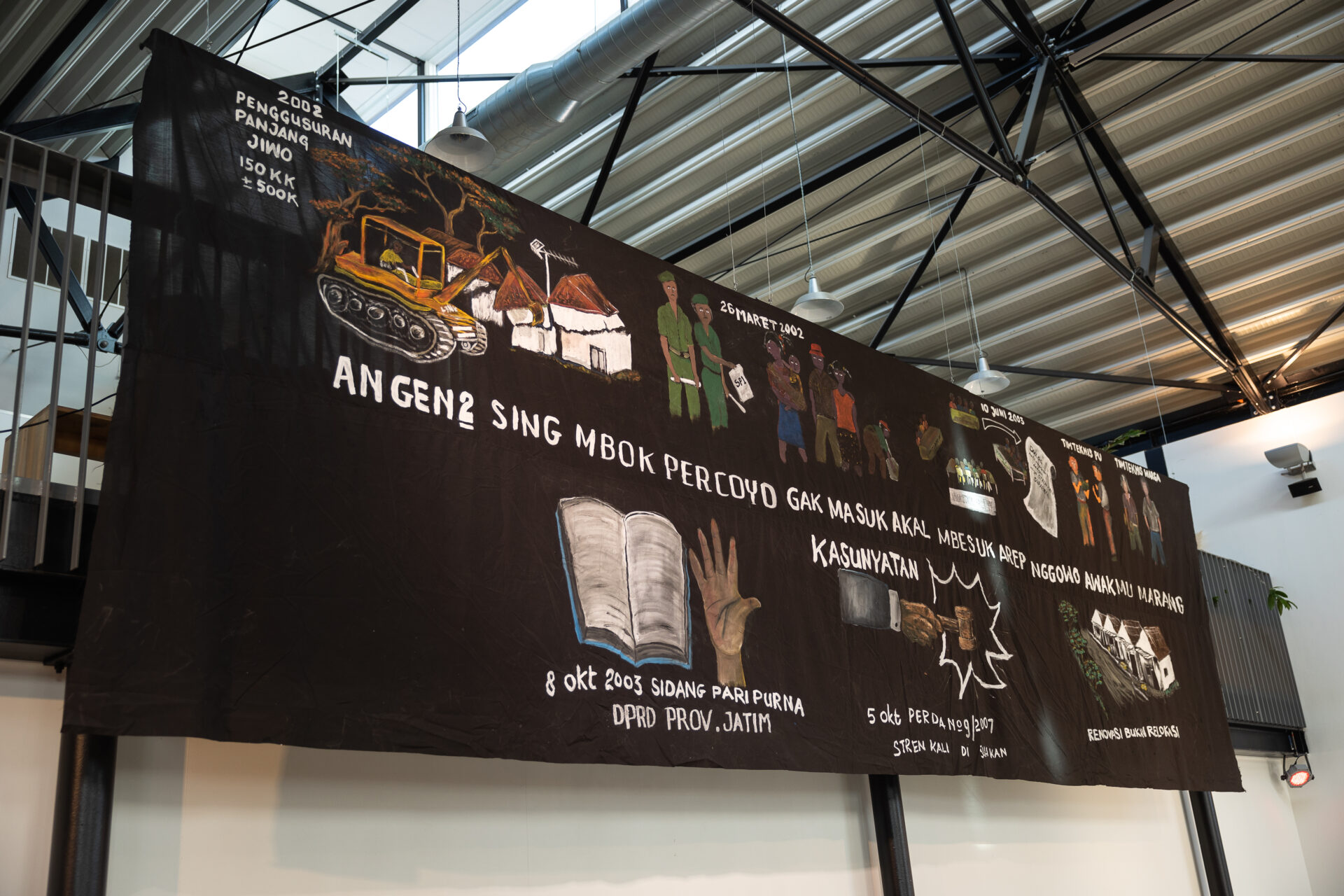
Imagine: what would an (art) institution look like if – instead of let’s say a pyramid – it was organised like a field where different zones are dedicated to different scopes, and all these zones worked in symbiosis with each other? Maybe you already have some examples popping up in your mind. Maybe you are thinking what could be changed in institutions you are familiar with. The work of the artist duo Bik Van der Pol can be an inspiration towards this kind of approach. In 2015, within the framework of the 16th Jakarta Biennial, they collaborated with Strenkali communities (riverside communities in Surabaya, Indonesia) to amplify their voices through an international art institution. Part of this work is visible at Framer Framed. A hand painted banner, black fabric, roughly five by two meters – I have to tilt my head to embrace it all within my sight. The brush strokes trace the chronology of the community’ political demands to safeguard the river and its inhabitants: Jogo Kali / Guarding the River. In another work, presented in a video installation, the duo invited a group of participants To Gather on a Mountain – this is the title – and reflect on questions such as: What is the ‘public good,’ and who benefits from the actions that are supposed to be ‘good’?[1]
In the exhibition themes of colonial violence, coexistence, ancestral knowledge, resilience, and fragility intertwine and flow from one work to the other – as to declare: all these struggles, all these joys are very much interconnected with each other. From my perspective, The One-Straw Revolution successfully speaks about how separated categories and super-imposed boundaries fail in front of the wholeness and lively complexity of our planet. In the video installation Soot Breath // Corpus Infinitum Denise Ferreira da Silva and Arjuna Neuman turn to tenderness as a means to reimagine a worldly configuration where humans are in resonance with the earth, rather than in conflict with her and each other. Uriel Orlow’s Learning from Artemisia presents the possibility of a more-than-human collaboration from the point of view of a community that cultivates Artemisia afra, a powerful plant antidote to malaria. Curled up on a big printed cushion, I listen to Eliana Otta’s sound installation. To Beatriz and The Sacred Hole collects sounds from the Peruvian forest, memories, and conversations and harmoniously twines them in a dream-like stream of consciousness. With my eyes closed I learn about the assassination of Beatriz’s father, a leader of the Peruvian Indigenous Community Nuevo Amancer Hawai, instigated by a wood-felling company. I also learn how Beatriz and her community are able to sustain themselves exclusively with produces of the forest and its waters every time they hike there for multiple days.
The more one adventures along the low straw walls, the more it becomes clear the kind of revolution implicit in the landscape created by Fokianaki. It’s a revolution that is mostly silent, yet at times as loud and refreshing as a cry on top of a mountain
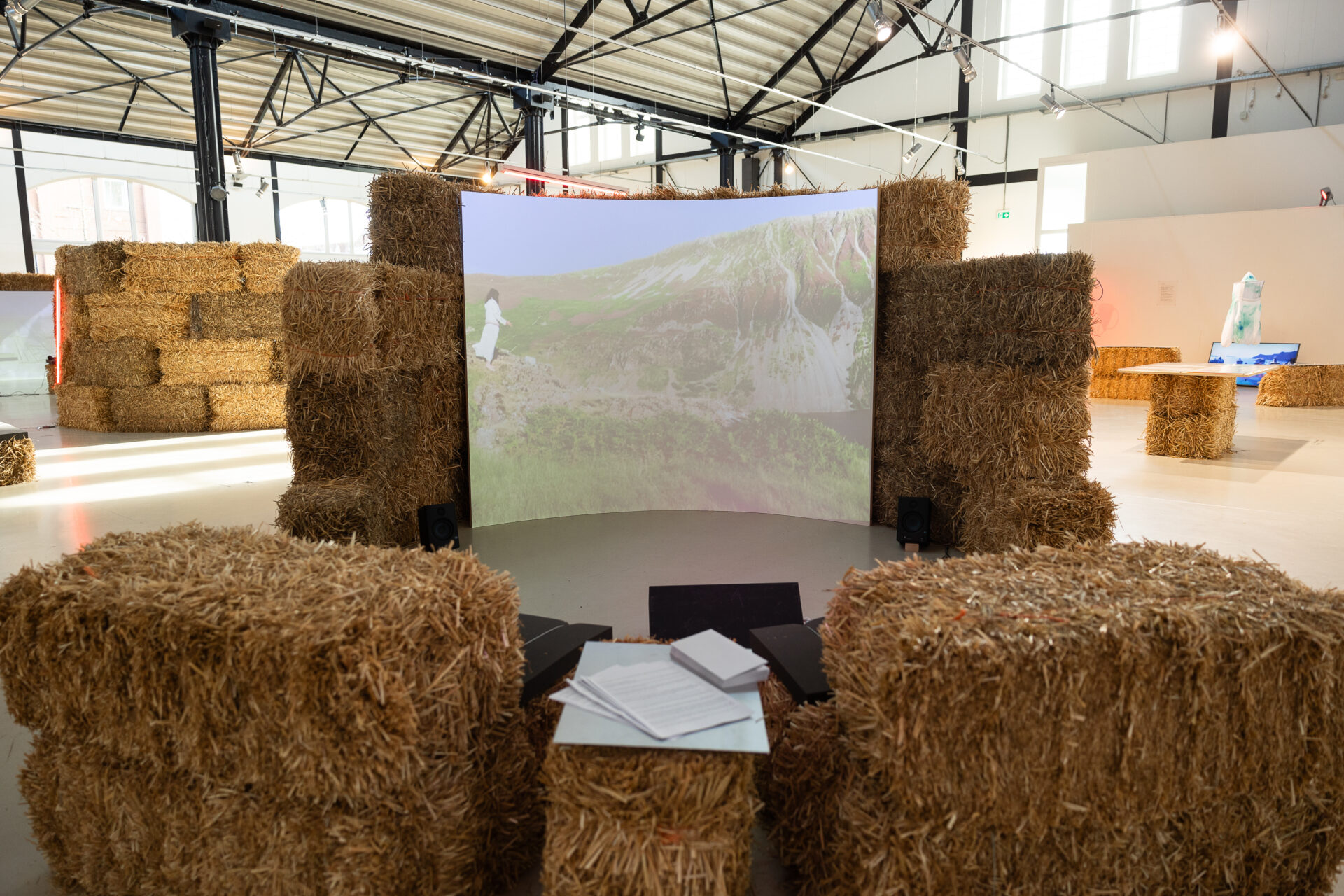
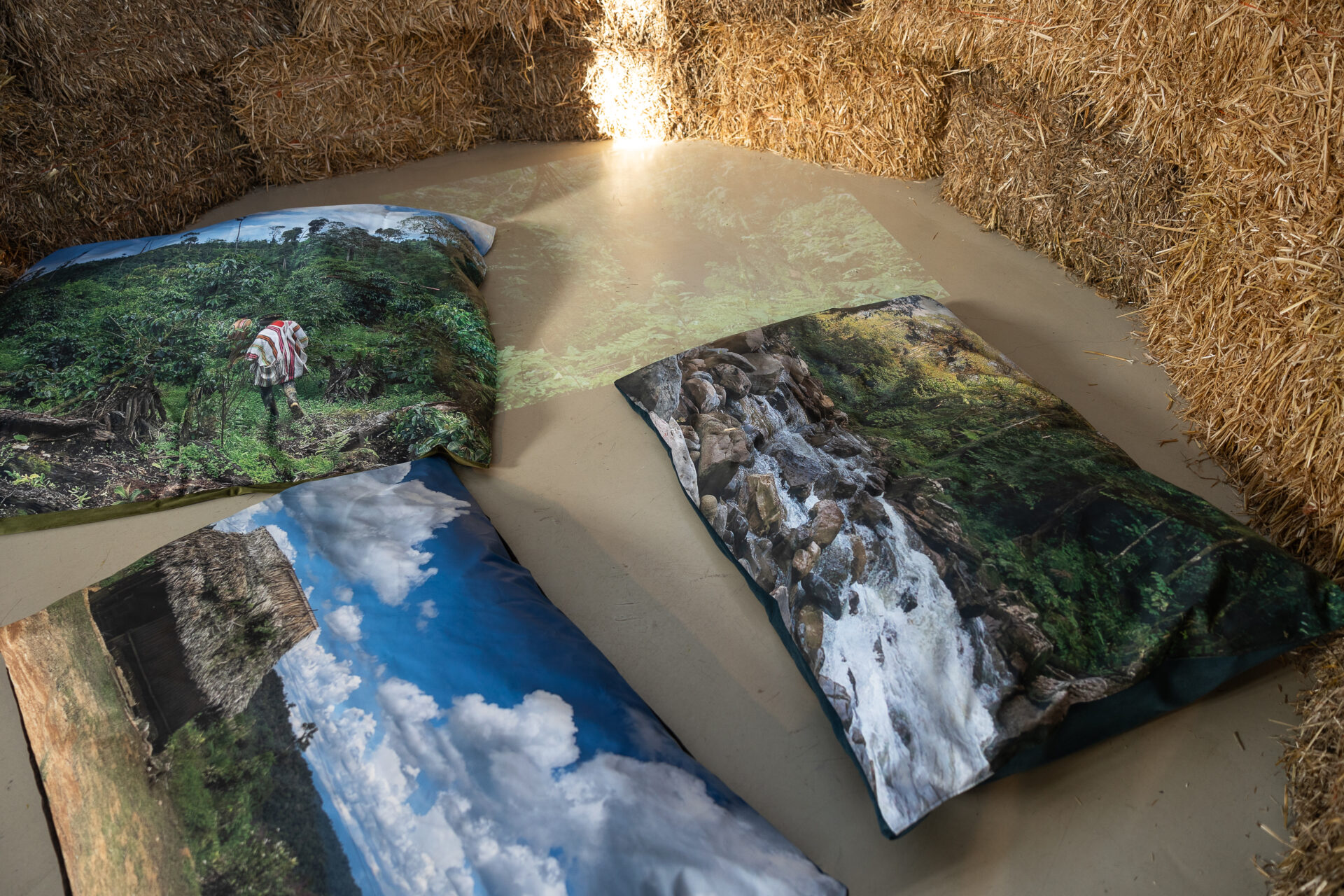
The more one adventures along the low straw walls, the more it becomes clear the kind of revolution implicit in the landscape created by Fokianaki. It’s a revolution that is mostly silent, yet at times as loud and refreshing as a cry on top of a mountain. In Himali Singh Soin’s An Affirmation it is the mountain itself that laments radioactive decay of its surroundings. Bending the binary rhetoric of good and evil, the lament is addressed to ‘my friend, the atom.’ It’s a revolution that grows from within, from shared struggles and mutual care, attuned to the rhythms of nature. It’s a revolution that – for once – doesn’t demand ‘us over them,’ but envisions an intersectional reformulation of the way humans interact with the world and its creatures. It’s a revolution that speaks what Ursula K. Le Guin names the mother tongue, [2] a gentle language suited for imagination, the same language spoken in Citra Sasmita’s lush, post-patriarchal world (in the tapestries Memorabilia from Far Away and Enigma).
While I leave the space, my thoughts buzzing rather than soothed, four words echo in my mind: ‘Rain crackles like fire.’[3] If water can have the same characteristics as flames, I wonder, what can this teach us in terms of exchange rather than seclusion, entanglement over separation?
The One-Straw Revolution is on view until May 19, at Framer Framed in Amsterdam
[1] From the exhibition booklet
[2] As opposed to an overtly confident, encaged-in-assertions father tongue. Ursula K. Le Guin, Bryn Mawr Commencement Address, 1986. First published in Dancing At The Edge Of The World: Thoughts on Words, Women, Places, Harper & Row, 1989
[3] Denise Ferreira da Silva and Arjuna Neuman, Soot Breath // Corpus Infinitum, 2020-22
Beatrice Cera

















